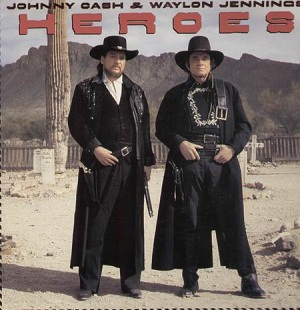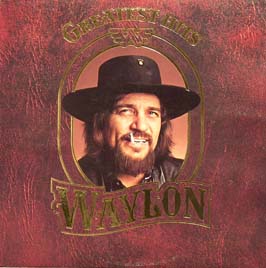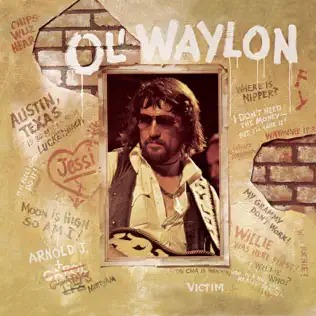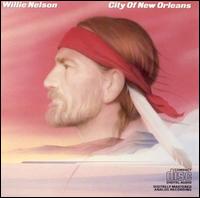
Pancho & Lefty by Townes Van Zandt (1972) became well-known through a honky tonk album by outlaw country musicians Merle Haggard and Willie Nelson, released in 1983. Original vinyl copies from 1983 give the album's title as "Poncho & Lefty" on the cover, as well as on the inner sleeve and the record label; the album's title track is similarly rendered "Poncho & Lefty" on the cover, inner sleeve, and label. Later editions correct the title to the intended "Pancho & Lefty.” They are backed by Don Markham of The Strangers.
Lincoln Wayne "Chips" Moman was an American record producer, guitarist, and songwriter. He is known for working in R&B, pop music and country music, operating American Sound Studios and producing hit albums like Elvis Presley's 1969 From Elvis in Memphis and the 1985 debut album for The Highwaymen. Moman won a Grammy Award for co-writing "(Hey Won't You Play) Another Somebody Done Somebody Wrong Song", a 1975 hit for B.J. Thomas.

Class of '55: Memphis Rock & Roll Homecoming is a collaborative studio album by Carl Perkins, Jerry Lee Lewis, Roy Orbison, and Johnny Cash. It was released on May 26, 1986, by America/Smash Records, a subsidiary of Polygram Records. The album was produced by Chips Moman.

Highwayman is the first studio album released by country supergroup The Highwaymen, comprising Kris Kristofferson, Johnny Cash, Waylon Jennings and Willie Nelson. Highwayman, released through Columbia Records in 1985, was the group's first and most successful album.
"City of New Orleans" is a country folk song written by Steve Goodman, describing a train ride from Chicago to New Orleans on the Illinois Central Railroad's City of New Orleans in bittersweet and nostalgic terms.

Reggie Grimes Young Jr. was an American musician who was lead guitarist in the American Sound Studio house band, The Memphis Boys, and was a leading session musician. He played on various recordings with artists such as Elvis Presley, Joe Cocker, Dobie Gray, Joe Tex, Merrilee Rush, B.J. Thomas, John Prine, Dusty Springfield, Lynn Anderson, Herbie Mann, J.J. Cale, Jimmy Buffett, Dionne Warwick, Roy Hamilton, Willie Nelson, Waylon Jennings, the Box Tops, Johnny Cash, Jerry Lee Lewis, Merle Haggard, Joey Tempest, George Strait, and The Highwaymen. Young was inducted into the Musicians Hall of Fame and Museum in 2019.

Highwayman 2 is the second studio album released by American country supergroup The Highwaymen. This album was released in 1990 on the Columbia Records label. Johnny Cash had left Columbia several years earlier, making this a "homecoming", and ultimately his final work for Columbia as the next Highwaymen album would be issued on another label.

Rainbow is the 70th album by American country singer Johnny Cash, his last for Columbia Records, released in 1985. "I'm Leaving Now", which was re-recorded 15 years later for Cash's American III: Solitary Man, was released as a single rather unsuccessfully, but the album's signature song is a cover of Kris Kristofferson's "Here Comes That Rainbow Again", which also appeared on Cash's 1995 collaboration with Kristofferson, Willie Nelson and Waylon Jennings - known as The Highwaymen - entitled The Road Goes on Forever, though it was sung solo by Kristofferson on the latter. Also included is a cover of Creedence Clearwater Revival's "Have You Ever Seen the Rain?," from Pendulum. The album also includes the song "Love Me Like You Used To," which was later recorded by fellow country singer Tanya Tucker, and became a country hit for her. Following the release of this album and a duet album with Jennings in 1986, Cash moved to Mercury Records as a result of Columbia's fading interest in his music, though he later returned to Columbia for the second Highwaymen album.

Heroes is a duet studio by American country music singers Johnny Cash and Waylon Jennings, released on Columbia Records in 1986.

Repossessed is an album by Kris Kristofferson, released on Mercury Records in 1986. It was Kristofferson's first full-length solo album since 1981's To the Bone, although the singer did collaborate with other artists in the meantime, most notably on Highwayman with Johnny Cash, Waylon Jennings and Willie Nelson.

Greatest Hits is a compilation album by American country music artist Waylon Jennings, released in 1979 by RCA Records.

WWII is a duet album by Waylon Jennings and Willie Nelson, released on RCA Victor in 1982.

Take It to the Limit is an album by Willie Nelson with Waylon Jennings, released in 1983 on Columbia Records.

Ol' Waylon is a studio album by American country music artist Waylon Jennings, released on RCA Victor in 1977. It eventually became one of Jennings' highest-selling albums, due in no small part to the phenomenal success of the chart-topping "Luckenbach, Texas ." It was also the singer's fourth solo album in a row to reach the top of the country charts, remaining there for thirteen weeks and becoming country music's first platinum album by any single solo artist.

Black on Black is a studio album by American country music artist Waylon Jennings, released on RCA Victor in 1982.

Suspicious Minds: The Memphis 1969 Anthology is a two-disc compilation of Elvis Presley's studio recordings at American Sound Studio during the winter of 1969, released in 1999, RCA 67677-2. This set features all of the master recordings made by Presley that would eventually feature on multiple singles as well as the albums From Elvis in Memphis and the studio disk of From Memphis to Vegas/From Vegas to Memphis. Original recordings produced by Chips Moman and Felton Jarvis.

"Luckenbach, Texas " is a song recorded by American country music artist Waylon Jennings. It was released in April 1977 as the first single from the album Ol' Waylon. It was written by Chips Moman and Bobby Emmons.

Always on My Mind is the 27th studio album by country singer Willie Nelson. It was the Billboard number one country album of the year for 1982, and stayed 253 weeks on the Billboard Top Country Albums charts, peaking at number one for a total of 22 weeks, as well as spending 99 weeks on the Billboard 200 for all albums, peaking at number two for 3 weeks.

Partners is a studio album by the American musician Willie Nelson, released in 1986. Johnny Gimble played fiddle on the album.

What a Wonderful World is the 36th studio album by country singer Willie Nelson released in March 1988.


















